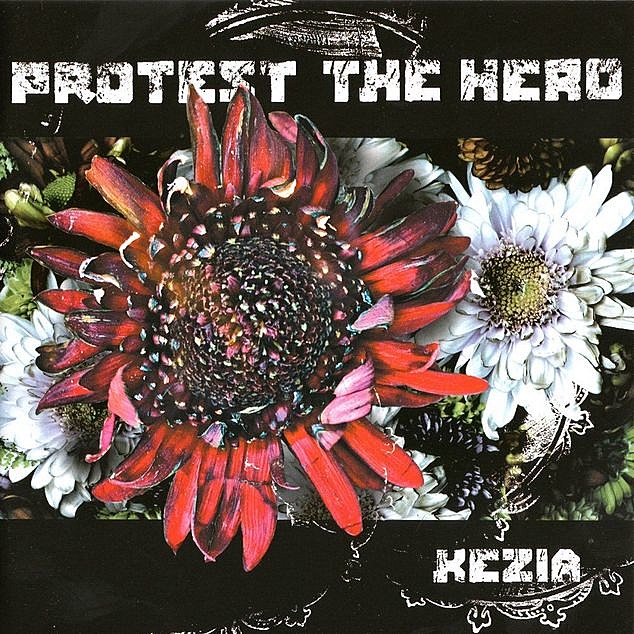
How To Crash A Fortress
…
For the rest of April, Canadian progressive metal band Protest The Hero are touring North America to commemorate the ten-year anniversary of their sophomore album Fortress. In 2008, the band could not have been in a better position. Their debut album Kezia, released while the band were too young to legally drink in the U.S., proved that they were skilled beyond their years and unafraid to tackle weighty subject matter. For their follow-up, they secured distribution in the states from Vagrant Records, a label riding high on the wave of Dashboard Confessional income at the time. Vagrant treated Protest The Hero the way LeBron James treated Miami fans upon signing with the Heat in 2010, delivering not one, not two, not three, but four music videos to promote Fortress.
In October 2017, Fortress was re-released on cassette by Zegema Beach, a boutique screamo label that specializes in underground bands.
There is no better summary of Protest The Hero than the contrast between these two rollouts. They are a band capable of touring for over a month on the reputation of a record released ten years prior, but are now consigned to the world of independent cassette labels (no shots at Zegema Beach, they do good work). A band that couldn’t break even during their time in the label system but able to raise 273% of their goal for a crowdfunded album. A band simultaneously gifted with out-of-this-world technical facility, but grounded by a punk ethos that allowed them to survive outside of the machinations of the music industry.
At the center of this strange and winding road is Fortress, an album that delivered on every promise that Protest The Hero made musically, but overshot their ability thematically. Fortress is the pivot point in Protest The Hero’s career, and if they see it as worthy of a victory lap ten years later, then it is only right that we examine how it made and broke Protest The Hero’s career.
…

…
Kezia; or, Why Every Peter Parker Needs a Gwen Stacy
If you were one of the few people already familiar with Protest The Hero prior to the release of Kezia, that album may have convinced you that they were bitten by a radioactive spider. On the A Calculated Use of Sound EP, Protest The Hero were a group of mild mannered teenagers, playing metalcore with more spunk than chops. A scant three years later, they were swinging over the heads of their competitors. In less time than it takes to graduate high school, Protest The Hero had transformed from Peter Parker into Spiderman, blessed with superhuman skills and the earnest sentiment of a would be hero.
Kezia sounds like skate-punk by way of Dream Theater. Atop a pogo-pace appropriate for any white-belt two-step mosh pit, guitarists Tim Millar and Luke Hoskin shot sweep-picked arpeggios like web slings. “We definitely wanted to wow people with some of the technical aspects,” guitarist Hoskin said during an interview on the the tenth anniversary of Kezia. The wow factor is evident to this day, but it was even more pronounced compared to the other “[noun] the [verb]” metalcore bands of the era. Even when the band went for the obvious breakdowns, like the end of “Heretics And Killers,” they used the open space as target practice for dizzying lead guitar work.
Technical prowess is one thing, but what truly separated Protest The Hero from the rest of the metalcore pack was their heart. While the rest of the scene was happy to indulge in casual misogyny, Protest The Hero openly, nakedly, and earnestly cared. Kezia is a three-act concept album about the prison industrial complex, organized religion, and harm that the patriarchy doles out on women. In the album’s lyrics, penned by then-bassist Arif Mirabdolbaghi, Kezia is a woman sentenced to death for an unspecified crime. The album then dissects her sentencing from the perspective of the executioner, the prison priest, and the prisoner herself. In the the album’s emotional climax “Turn Soonest To The Sea,” the band describe a system that tells women that “your flesh means more than you” and end the song with a fantasy of a world in which “no woman is a whore” over a melody ripped straight from a Disney musical.
…
…
To describe this album as ahead of its time would imply that pockets of the world wouldn’t find this naked sentiment corny as fuck to this day. This is, after all, an album where the phrase “social justice” is sung in two-part falsetto harmony with utter sincerity. “Turn Soonest To The Sea” represents a variety of male guilt that would get you roasted on Chapo Trap House as a try-hard. If their obvious reverence for bands like Thrice and Propagandhi weren’t enough to turn metalheads off of Protest The Hero, their openly feminist allyship hammered the coffin shut.
Regardless of the band’s challenging politics, Kezia gradually found an audience. Having gone from your friendly-neighborhood metalcore band to a legit superhero, Protest The Hero now faced the challenge of following up a successful debut. And like Spiderman haunted by the death of Gwen Stacy, they could never quite shake the specter of the girl they could not save.
…
…
Fortress; or, The Dangers of Going Cosmic
Faced with the difficult prospect of following up such an auspicious debut, Protest The Hero promised the stars. In an interview with Subba-Cultcha in 2008, Mirabdolbaghi described the album’s themes:
It has to do with goddess worship, and how there has been this de-gendering of the Lord and Savior, and the suppressed feminine. A lot of it is based in Genghis Khan and old Irish Mythology, about the rise and fall of the Goddess of the forest. [The theme] can be more appreciated by more people. If I had to reduce it to its simplest form, the concept is about the re-emerging of goddess worship and the erosion of faith in scientific process.
There’s a lot going on in that quote, but there’s even more happening on the record itself. In between descriptions of ancient conquerors and divine feminity, the band find time time to muse on the irony of death by drowning, criticize fear-mongering science fiction, and stop for a quick smoke session. This last digression, detailed on “The Dissentience,” is perhaps the most revealing element of the record. Fortress has both a stoner’s sense of “whoa dude” grandeur and completely shot attention span. Instead of coalescing into a single narrative like Kezia, Fortress wanders through a haze of concepts without clarifying how they all add up.
By all accounts, this ambiguity was intentional. In the same interview with Subba-Cultcha, Mirabdolbaghi makes it clear that they didn’t want to repeat Kezia, and instead wanted to make a “less nerdy” record.
A less nerdy Protest The Hero album is a contradiction. The group are deliriously dorky. Singer Rody Walker wears his Trekkie bona fides with pride, and referenced Les Mis as a source of lyrical inspiration for the band’s third album Scurllious. That the band have a latent musical theater influence isn’t surprising, as they share the form’s love of showmanship, camp, and raw feeling. Kezia filtered those impulses through a snotty punk approach, but Fortress gives into them fully and shamelessly. Not a moment on Fortress passes where at least one of the band’s five members isn’t doing the most. The band cram a full prog-epic’s worth of riffs and variations into scant three-minute bursts. Their songs are so structurally complex that they should feel like a slog to get through, but they tear through each section so quickly that the information overload hardly registers. Instead songs like “Spoils” and “Bloodmeat” feel like driving a Maserati down Mario Kart‘s Rainbow Road.
Musically, Fortress tops Kezia by every conceivable metric. It is bigger, bolder, more melodic, heavier, and crisper in its execution. Protest The Hero may have wanted to make a less conceptually stuffy album than their debut, but the ambition that fueled their instrumental performance seeped into Miradbolgahdi’s lyrics as well. Kezia may have been a fictional narrative, but its themes were grounded in the concerns of modern life. Fortress took the same interest in how social norms, faith, and systems of power intersected to oppress women and attempted to apply them to the whole of human history. To their credit, Protest The Hero didn’t let this conceptual bloat balloon their song lengths: the whole thing whizzs by in less than forty minutes. But a side effect of this expediency is that Miradbolgahdi doesn’t have many chances to clarify exactly what he means. References to Genghis Khan, Flidais, UFOs, and the unknowable origin of human life all zip by with little explanation.
If “The Dissentience” helps explain the album’s “hits bong once” philosophical tone, “Spoils” is the album’s sober moment of clarity. “Every word ever written will fall short of its intent,” singer Rody Walker yelps. “They will betray what they have meant.” The song, which kicks off the record’s third and final act, sounds like admission of the band’s inability to express the full scope of their ideas. Language fails. No matter how well chosen the phrase, some part of the speaker’s thoughts will remain inaccessible. Fortress‘s closing tracks only deepen this gulf. This is the only stretch of the album where the rapid-fire pace serves the album’s concept instead of detracting from it. In three songs, goddess worshipping pagan rituals are wiped out by Christianity, which are in turn gradually phased out by science. The specifics of these ideologies aren’t as important as they speed by which they are overturned. When our understanding of the universe changes so rapidly and our ability to express that understand fails so consistently, what value is there in expressing yourself at all?
…
…
Long Ride Home
By trying to top the humanism of Kezia, Protest The Hero ran smack into a existential crisis about the nature of artistic expression itself. It’s no surprise that while their following records carried on Fortress‘s hyperactive, shred-happy sound, their lyrics returned to more immediate subjects in line with their social consciousness. Around the same time, the band faced a more material crisis of identity. Having completed their contract with Vagrant/Underground Operations following the release of Scurrilous, Protest The Hero decided to opt out of the label system. For 2014’s Violition, they asked fans to fund the record themselves, and the band raked in enough cash to hire Chris fucking Adler to fill in for their recently departed drummer Moe Carlson. Then, for 2016’s Pacific Myth, they came full circle and released the EP directly to their fans as a Bandcamp subscription. Now, Fortress hangs like a banner above them, a symbol of their breakthrough as well as their conceptual undoing.
…
All three Protest the Hero albums are newly available on Zegema Beach Records.
…











